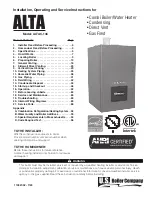
5
Plumbing connections
Before installation of the boiler, the heating system must be flushed and a water pressure test
carried out. The tightness of connections must be ensured after installation. The factory is not
responsible for damage caused by leaking connections.
Relief valve installation
The pressure relief valve must be CE-approved with a maximum opening pressure of 1.5 bar
and a minimum size of DN 15. It must correspond to the highest pressure class of the equip-
ment assembly. Between the valve and the boiler, no equipment may be installed, the connection
of which could be closed. The exhaust pipe must be dimensioned and installed so that it neither
restricts the exhaust efficiency of the relief valve, nor causes a hazardous situation when the val-
ve is working.
The capacity of the expansion vessel must correspond to the greatest possible fluid volume chan-
ge in the boiler system. In periodic heating, the expansion capacity must be approximately 10%
of the system volume. We recommend that only a closed system is used (membrane expansion
vessel).
Filling the system
Before heat is turned on, the storage tank and heating system must be filled with water.
Instructions for filling
•
Open all shutter valves, including the four-way mixing valve.
•
The pump must be switched off. Fill in the heating system.
•
Remove air through the accumulator and radiators.
•
When the system is filled, you can switch on the circulation pump and start heating.
•
When the water in the boiler has reached the set operating temperature, switch off the
pump and remove air from radiators again. This has to be repeated a few times.
Since there is a lot of air in the water at the start (up to 10%), it is normal for the pressure to
drop as air leaves the system. Therefore it may be necessary to add water on several occasions
when operating the boiler. The temperature of water returning to the boiler should be around
70°C, which is achieved through a by-pass connection illustrated in the connection diagram.
A sufficiently high boiler temperature throughout the operation keeps the convection surfaces
clean and achieves highly efficient combustion. This also enables a long service life for the boiler,
since no corroding acids will form on the fire surfaces.
INSTALLATION
Summary of Contents for VEDO
Page 1: ...INSTALLATION OPERATION AND MAINTENANCE Ariterm Vedo ...
Page 18: ...18 MANUFACTURES DECLARATION ...
Page 19: ...19 NOTES ...
Page 20: ...20 NOTES ...
Page 21: ...21 NOTES ...
Page 22: ...NOTES ...
Page 23: ...23 NOTES ...






































